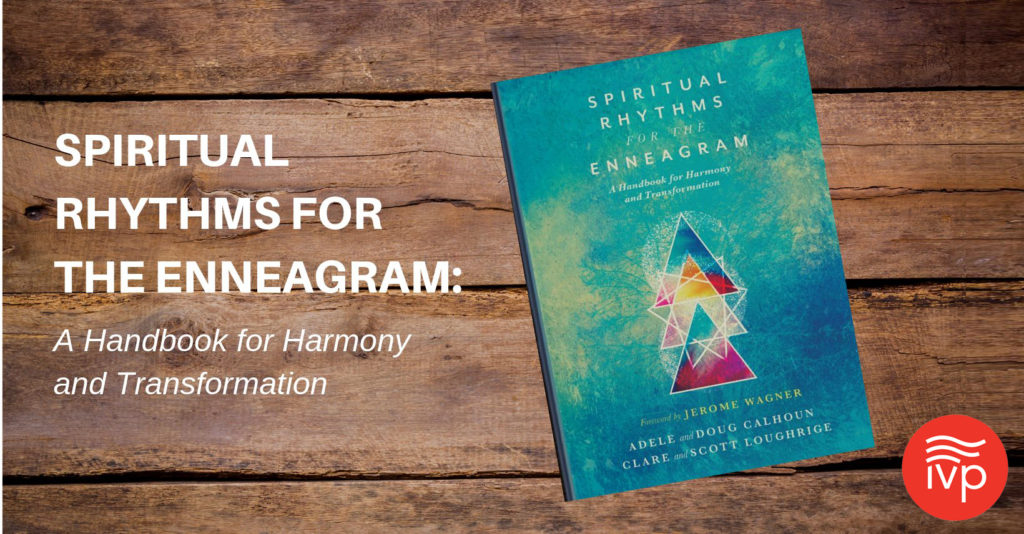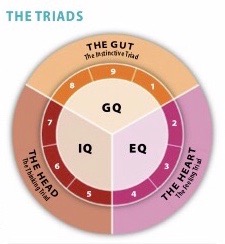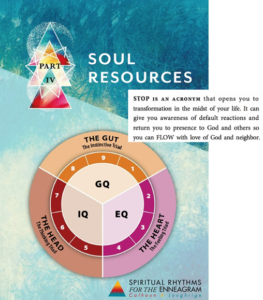You are more than your Enneagram Type

Enneagram Harmony Triads and Spiritual Formation
Adele Calhoun & Doug Calhoun
Clare Loughrige & Scott Loughrige
Transformation is the soul of the Enneagram. Anything short of transformation and it’s just another personality fad. Something here today and gone tomorrow. We find ourselves conflicted about Instagram Memes, Enneagram art, and Enneagram music. Often these vehicles are fun and give a new generation access to an ancient tool; and they can keep us defined by “type” rather than transformation. Let’s not lose sight of the value of the Enneagram as a tool that can heal relationships, open us to truth, draw us to God, and bring about spiritual transformation.
Soren Kierkegaard writes: With God’s help, I shall become myself. The Enneagram gets behind defenses and rationalizations to the truth of who we are.
In Spiritual Rhythms for the Enneagram we write, “The Enneagram can help you recognize your unique melody as well as where you are off-key internally and relationally. The Enneagram reveals your tempos, soloist agendas, and dedication to your “playlist.” Still, discovering the truth of your number can never encompass who you are. Nor does it automatically change you or your relationships. Relational repairs and healthy interactions take intention and attention. Enneagram insights have to be applied to the rhythms and grooves of ordinary daily lives to bring transformation and harmony.”
The Enneagram comforts and discomforts. It names how we default and defend ourselves from truth—especially truth about ourselves! Jesus continually struggled with people who were closed to new truth about God and themselves. During his last hours with his followers, Jesus said, “I have much more to say to you, more than you can now bear” (John 16:12). Jesus’ friends just weren’t prepared to hear truth that contradicted their agendas and self-understanding. Two thousand years later, we are no more prepared to bear and practice truth than Jesus’ disciples were.
For us personally, God graciously used the Enneagram in our lives to get around our defenses and blind spots so we could practice truth. The Enneagram revealed the reality of our inner discord and its effect on others. Knowing our Enneagram number gave us eyes to see how image, wounds, lies, triggers, and default responses shaped us every bit as much as our faith. Yet, recognizing our number was just the beginning of a journey that is changing us and our ability to love God and neighbor as we love ourselves.
HEAD, HEART, AND GUT INTELLIGENCE
Intriguing current research suggests human beings are created with head, heart, and gut intelligence. Your gut and heart each have a vast neural network just like your brain. In fact, your gut and your heart can “know” things before your brain does. We call the three intelligences IQ (Head Intelligence), EQ (Emotional/Heart Intelligence), and GQ (Gut Intelligence). In the therapeutic community the term Emotional Intelligence (EQ) generally includes the capacity to notice, control, and express your emotions in judicious and empathetic ways. Here, we use EQ to describe the intelligence of the Heart Triad as the capacity to feel and take cues for relating from the responses of others.
We believe the intelligences of IQ, EQ, and GQ line up with the way you were designed. You were created to love God, neighbor, and self with all your heart effect, gut strength, and mind thoughts. Loving is the most difficult spiritual work any of us have to do. Loving is intensely practical work that ripples out and affects neighbors near and far.
The Enneagram reveals that each Enneagram Triad has a preferred way of relating in the world. Numbers Five, Six, and Seven trust their head intelligence. Numbers Two, Three, and Four trust their heart intuitions. Numbers Eight, Nine, and One trust their gut instincts.
THE TRIADS

When each Enneagram number learns to integrate head curiosity, heart emotions, and gut instincts, we respond to love and work in richer, healthier, and more harmonious ways. The Enneagram invites you to investigate the discord that puts you out of tune. It suggests that to experience the music of life in its fullness, you need to trust something besides your solo part.
Harmonious relationships aren’t a result of everyone seeing things “my way” or doing things “my way.” Harmony comes from trusting that the head and the gut enrich what the heart brings. Still, some of you trust one of these intelligences more than the others. As you look at the head, heart, and gut triads (fig. 1), which one do you favor?
Yet nature, nurture, and trauma can shut down one or more of these intelligences, so we continually solo on one default intelligence. When that happens, we undernourish or dismiss parts of ourselves that can bring harmony.
When each Enneagram number learns to integrate head curiosity, heart emotions, and gut instincts, we respond to love and work in richer, healthier, and more harmonious ways. The Enneagram invites you to investigate the discord that puts you out of tune. It suggests that to experience the music of life in its fullness, you need to trust something besides your solo part.
TRADITIONAL ENNEAGRAM THEORY

While traditional Enneagram theory is built on these three centers of intelligence, it doesn’t provide ways for every number to access them. Looking at the traditional Enneagram diagram (fig. 2), with arrows indicating directions of disintegration and integration, you’ll notice that the arrows do not connect every number to head, heart, and gut. Numbers Two, Four, Five, and Seven access only two types of triad intelligence rather than three. Five and Seven are two-headed and without a heart. Two and Four are two-hearted and without a head.
THE HARMONY ENNEAGRAM

To address this issue, the Harmony Enneagram (fig. 3) reimagines the connecting lines to create three balanced triangles: Eight, Two, and Five; Nine, Three, and Six; and One, Four, and Seven. The Harmony Enneagram takes the music of your automatic intelligence—be it head intelligence (numbers Five, Six, Seven), heart intelligence (numbers Two, Three, Four), or gut intelligence (numbers Eight, Nine, One)—and integrates the voices of the other two intelligences.
Every number is connected to two other intelligences, even if you have dismissed or don’t trust one or both of them. Integrating gut, heart, and head creates capacity to see and respond with more than your single center of intelligence.
STOP

STOP is just one of the soul resources in Spiritual Rhythms for the Enneagram. STOP opens you to transformation in the midst of your life. It can give you awareness of default reactions and return you to presence to God and others so you can FLOW with love of God and neighbor.
Many of your triggers and reactions are so automatic you don’t even realize they are happening. Words you didn’t intend to say fly out of your mouth. You wish you could take your actions back. You need help to STOP.
Under stress and in the heat of the moment, there is always a tiny sliver of time when you can send your ego energy in a different direction and return to your true self. STOP opens you to the help of the holy three-in-one God who designed your brain with neural plasticity to transform and renew your mind. Transformation cannot happen unless you stop, notice a trigger, and open. Opening makes space for the Spirit. God’s Spirit can give grace in a split second! Grace can override the reactionary fight, flight, or freeze responses of the brain’s amygdala and develop new neural pathways to the prefrontal cortex where responses such as love, joy, and peace originate. The Spirit partners with you to help you notice how you constrict around wounded and broken places in yourself or others. The Spirit can help you let go of constriction and open you to a new response. Transformation of ingrained habitual reactions happens incrementally over time as you practice new ways of responding.
STOP is a sign you can recognize in the moment and then follow these steps:
See: ask God to give you eyes to see.
- Take a deep breath.
- What does your Enneagram number automatically see here?
- Seek to visualize things from another perspective.
Triggers: notice without judgment.
- What just happened in you?
- What got you out on the edge of your number?
- Where did you leave your true self behind? If you don’t have time to really think this through now, notice and come back to this trigger later.
Open: access your head, heart, and gut. Breathe into your harmony; it will loosen your constriction around your false self. Think about:
- What does my head IQ think about this?
- What does my heart EQ feel about this?
- What is my gut instinct GQ about this?
Presence: intentionally return to God’s presence.
- What is God’s invitation in this moment?
- Intentionally give your attention to reality as it is. What do you see and hear?
- What would it look like to be free in this present moment? Choose where your presence and energy will go.
- What would God’s presence within do right now?
You can work with these questions in moments when you are and are not triggered. It’s impossible to answer all the questions in a sliver of time. Still, by God’s grace, you can STOP and notice what triggered you. The more you STOP, the more your awareness grows. The more your awareness grows the more you can be present to God in the moment. It is being present to the Spirit that helps you change your default autopilot. Remember, you can always return to a difficult encounter and debrief your trigger later in the presence of God, who is ready to help you become your beautiful, integrated, beloved, true self.
In Spiritual Rhythms for the Enneagram, we have a STOP practice specific to each Enneagram Style! Spiritual Rhythms for the Enneagram contains a variety of spiritual practices and resources specific to your Enneagram type. Click here to get your copy.
Contact Calhouns or Loughriges for Workshops, Retreats and accredited International Enneagram Training and Certification.
